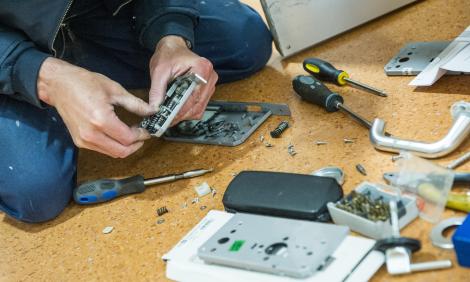Carpenter/joiner
Our buildings need to be kept in good repair so they are safe and pleasant environment for patients, staff and visitors. Carpenters are part of the estates team that make this happen.
Working life
As a carpenter/joiner you may work inside or outside a building. You maintain and repair parts of buildings, mainly working with wood products.
You could be:
- repairing damage in and around the building
- changing locks
- fitting fire doors
- making and assembling on a workbench
- hanging shelves
- working on roof timbers
Some carpenters are multi-skilled and can take on a range of maintenance tasks such as painting and decorating, plumbing or tiling.
Who will I work with?
You will typically work with other estates maintenance staff including painters and decorators, plumbers, tilers, electricians and bricklayers. You will work under the direction of the estates manager. When you are working in a building, there may be staff and patients there, but you would not have direct contact with patients.
Where will I work?
You will be part of the estates staff and may have to travel between sites in an NHS vehicle or your own van.
Carpenters also work for carpentry and joinery and building companies who provide services to the NHS.
Entry requirements
There are no set entry requirements. Employers usually expect a qualification in carpentry or joinery, such as an NVQ, certificate or diploma. They may also expect some experience of construction work. Employers may ask for qualifications or experience, or both, in other related areas such as painting and decorating.
Although carpenters often join the NHS fully qualified and experienced, it may be possible to train in carpentry or joinery. Employers usually ask for GCSEs (or equivalent) including English and maths.
Skills needed
Carpenters need to be:
- interested in practical work and repairs
- able to follow technical instructions
- accurate and methodical
- willing to work at heights where necessary
- able to use hand tools and power tools
- health and safety aware
- practical skills
- manual (hand) skills
- organisational skills
Training and development
When you start as a trainee carpenter, your training will include:
- health and safety
- how to use the tools and equipment
- all aspects of carpentry and joinery
You will be expected to study for qualifications such as NVQs and may be offered an apprenticeship. You may also be encouraged to become multi-skilled by training in, for example, painting and decorating or plumbing.
-
Estates staff working in the NHS are paid on the Agenda for Change (AfC) pay system. As an estates support worker, you could start on AfC band 2. As a qualified craftsperson in estates maintenance, you will typically start on AfC band 3. With further training and experience, you could apply for more senior positions at bands 4 and above.
Carpenters and joiners in the NHS are likely to work standard hours of around 37.5 a week. Some may work shifts including early starts, evenings and weekends.
Terms and conditions will usually be different for carpenters and joiners working outside of the NHS.
-
With experience, you could become a supervisor, overseeing the work of a team of staff. With further experience, you could become a manager, responsible for the maintenance and repairs service for a hospital, area or trust.
Some carpenters become self-employed by setting up a business, either on their own or with one or more colleagues.
If you're applying for a role either directly in the NHS or in an organisation that provides NHS services, you'll be asked to show how you think the NHS values apply in your everyday work. Find out more about NHS values.
Most NHS trusts advertise their vacancies on NHS Jobs. Some of the current vacancies are below.
-
Multi-Skilled Carpenter / Joiner
Burton-On-Trent, DE13 0RB
- Salary :
- £31607.00 to £34682.00
- Type :
- Permanent
- Employer :
- University Hospitals of Derby and Burton NHS Foundation Trust
-
Multi-skilled Craft Worker - Carpenter and Joiner
Base to to confirmed (Bronllys or Llandrindod), LD3 0LU
- Salary :
- £27898.00 to £30615.00
- Type :
- Permanent
- Employer :
- Powys Teaching Health Board
-
Joiner - £2.5K Incentive
Sunderland, SR2 0NB
- Salary :
- £16.58
- Type :
- Permanent
- Employer :
- NTW Solutions Limited
-
Maintenance Craftsperson Carpenter
Leicester, LE3 9QP
- Salary :
- £27485.00 to £30162.00
- Type :
- Permanent
- Employer :
- University Hospitals of Leicester NHS Trust
-
Maintenance Craftsperson Carpenter
Leicester, LE5 4PW
- Salary :
- £27485.00 to £30162.00
- Type :
- Permanent
- Employer :
- University Hospitals of Leicester NHS Trust
-
Maintenance Craftsperson Carpenter
Leicester, LE1 5WW
- Salary :
- £27485.00 to £30162.00
- Type :
- Permanent
- Employer :
- University Hospitals of Leicester NHS Trust
-
Maintenance Craftsperson Joiner - £2.5K Incentive
Morpeth, NE61 3BP
- Salary :
- £16.58
- Type :
- Permanent
- Employer :
- NTW Solutions Limited
Showing 6 of 7 results





